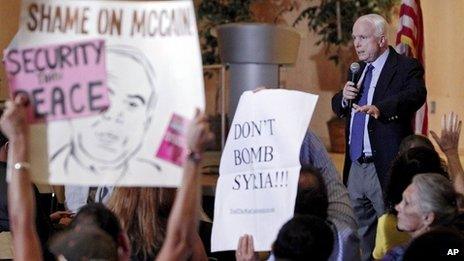War-weary Ohio town-hall voters wary of Syria plan
- Published

Some members of Congress are finding the Syria-strike plan a tough sell back in their constituencies
Congressman Bill Johnson urges everyone in the audience to move up to the front of the meeting.
The hall in Central Catholic High School in Steubenville, Ohio, isn't exactly packed - in the middle of a working day - there are around 20 people here.
He's called the town hall meeting to talk about education, but starts off by saying Syria is at the front of everyone's mind. He may not be right. He's already told me that not a single member of the public has made the case that the president should launch a military strike.
He tells the small gathering that he is as horrified as everyone else at the images from Syria, but it is not the only place innocent people are being killed by bad leaders doing bad things.
"Does America always get involved?" he ask rhetorically.
He was deeply unimpressed by the secret intelligence briefing at the beginning of the week on Capitol Hill. He drove for 10 hours to get to it and he expected the president to address them, or at least the vice-president. They weren't there.
He says he wants to know what security risk Syrian chemical weapons pose to the US, what objectives the government has, and how it will get out and whether the president has the support of the American people.
He had to wait a while to find out. Most people were more interested in talking about his other topics; jobs and education.
But some did want to talk about foreign policy.
One man said: "It's a mess over there. What are cruise missiles going to do but kill people? If he wants to send a message, text him. I say there's no plan."
A woman said: "It's like throwing a firecracker at the high-school bully and telling him, 'we need to get your attention'.
"It's not going to work and it's going to end up with missile after missile, and then it's going to be those boots on the ground."
(She had a way with words. Earlier she told me a cruise missile attack would be like sticking a pin in an elephant.)
There was only one challenge to the doubters. Another woman said the mess was the Republicans' fault and America was all about extending a helping hand to those who were suffering.
Then it was off to Toronto. Toronto, Ohio, that is, about eight miles away. The congressman told the audience over a roast beef lunch in the basement of a church hall a bit more about his background.
Brought up on a "two-track mule farm", he says he was so far the wrong side of the tracks that he couldn't even hear the whistle blow.
But after the folksy introduction, he grew serious. After 26 years in the US Air Force, ending up as a lieutenant colonel liaising with special forces, he said he knew all about sending men into action.
He said the idea that American credibility was on the line was wrong - enough young men had shed blood on foreign soil fighting against tyranny for America's resolve to be beyond doubt.
Only one person raised foreign policy - and she was talking about Afghanistan. She told me afterwards that she had a nephew out there and she was worried he would be shipped out to Syria next. She opposed action.
One man said the trouble was the politics - interventions would go ok if it wasn't for the politicians. No-one spoke up in favour of the president's plan.
I did run into one supporter later, a Vietnam veteran who told me Syrian leader Bashar al-Assad had to be punished because if he wasn't, someone else would use chemical weapons and very soon American troops would be on the receiving end.
But he said he thought Congress would vote 'no'.
"If Obama proposed cookies and cream, they'd turn it down," he said. Going on past evidence, he has a point.
Judging by my trip to Ohio and talking to people more generally, Americans are not seething with fury at the idea of an attack on Syria. It may be at the top of the news - but it isn't at the top of Americans' concerns.
The majority aren't jumping up and down about it, but they aren't convinced it's necessary. They worry, almost automatically, that it will lead to greater involvement.
It would be surprising if this wasn't the case after Iraq, especially among Democrats. What is new, and what could prove poisonous for the president, is a much stronger anti-war mood among Republican politicians and their natural supporters.
For those in Congress, part of it is down to a dislike and mistrust of Mr Obama and the feeling he has no coherent plan.
But the people they represent are just fed up with their politicians trying to solve problems on the other side of the world rather than at home.
It makes it much more difficult for the president to win the vote. It means problems will not go away for Mr Obama even if he does.
- Published4 September 2013